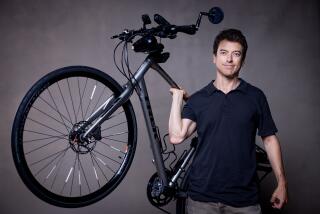Opinion: It’s easy for L.A.’s leaders to be tough on the gun lobby. Let’s see them try standing up for road diets
When it comes to standing up to the gun lobby, Los Angeles’ leaders are rightly all-in. Our city has some of the strictest gun control laws in the country, and a recent bill by L.A. City Councilman Mitch O’Farrell would boycott companies that do business with the National Rifle Association. As the United States coalesces around the courageous teenage survivors of gun violence in Parkland, Chicago and Ferguson to challenge the NRA’s political clout, L.A.’s elected officials are uniting our city in solidarity.
When it comes to fighting traffic violence, however, these same leaders can’t seem to find the same political moxie.
Two hundred and thirty-nine. That’s the number of Angelenos who were murdered with guns in 2017. In the same year, 244 Angelenos were killed in traffic crashes. City leaders claim to be taking this epidemic seriously; they vowed to end traffic deaths by 2025 with a citywide traffic safety plan called Vision Zero. But they’ve been largely unwilling to take action to implement this plan in the face of political backlash from a small but loud group of car-centric zealots.
Activists promising to ‘restore’ space for cars and to maintain high vehicle speeds have metastasized their fight against meaningful pro-safety reforms from a local effort centered in L.A.’s Westside into a countywide assault on the effort to reduce traffic deaths. And our elected officials appear to fear them, canceling numerous long-planned projects to appease these activists.
In both gun-violence and traffic-violence policy, the battleground is science and data. The NRA and its supporters oppose any efforts to study gun violence in a way that would inform policy making, blocking federal funding for gun violence research for over 20 years.
L.A.’s anti-traffic-safety lobby, meanwhile, vocally questions the accuracy of data collected on traffic injuries and deaths. One federally classified “proven safety countermeasure” in particular has become a target for their obfuscation: the street safety reconfigurations known as “road diets.”
Road diets are used nationwide as a means of improving roadway visibility, vehicle turning, traffic flow and to reduce speeding. They are globally recognized as the most effective tool to reduce traffic deaths and injuries, with scientific studies showing up to a 47% reduction in overall crashes when installed — not just for people walking or biking, but for drivers as well. They have been used locally to improve the safety of L.A.’s streets since at least 1980.
Like the gun control debate, we need our elected officials to make policy decisions based on data, instead of kowtowing to misguided activists.
And yet — invoking a distinctly Trump-like paranoia and embrace of alternative facts — anti-safety activists routinely contend that these national studies are wrong: that road diets make streets more dangerous and are part of a nefarious plot of social engineering “meant to force citizens of L.A. into public transit under the guise of safety,” as one Playa del Rey resident declared on Twitter.
While decrying road diets, this anti-traffic-safety contingent lobbies instead for more police officers writing tickets to curb speeding drivers on city streets. Not only would this expensive and inefficient proposal likely exacerbate issues of racial inequality in policing, it avoids dealing with the primary cause of traffic violence: roads that are designed to encourage speeding.
Sound familiar? It’s not much different than the NRA’s proposal to ignore proven gun control methods in favor of arming teachers and putting more police officers in schools.
Like the gun control debate, we need our elected officials to make policy decisions based on data, instead of kowtowing to misguided activists.
Consider Councilman O’Farrell’s L.A. district, where five Angelenos have been killed and twenty-one seriously injured on a small 2.3 mile stretch of Temple Street in the past eight years. The street holds the dubious distinction of being one of the 6% of streets that account for nearly two-thirds of all L.A. traffic deaths. To rectify this nightmare, the Los Angeles Department of Transportation proposed a road diet along with other safety improvements on Temple. Throughout 2017, it organized multiple community meetings and informational events to present the plan. But an anti-safety zealot from Manhattan Beach caught wind of the effort and mobilized to attack the project.
In the face of this blowback, O’Farrell — who had previously voted in favor of the city’s Vision Zero policy — killed the Temple road diet, saying he opposed a safety reconfiguration “unless there is significant, widespread outreach and support from immediate residents and businesses.” He gave no explanation of what he would do as the elected representative of the area to help perform that outreach or to build consensus for a Vision Zero project on Temple.
When pressed about the difference between his response to traffic violence and gun violence, O’Farrell only had two words: “Nice try.”
America needs our leaders to make tough political choices in the interest of public safety. Little political grit is required to be strong on gun control from the heart of liberal Los Angeles. Meanwhile, our leaders are asking politicians in red states like Florida and Texas to buck the will of one of the strongest lobbying groups within their districts. They should show the same courage here to do something about the dangerous condition of our city streets.
Michael MacDonald is a Los Angeles-based architect and winner of the 2018 Biddy Mason Community Advocate for Walking Award selected by Los Angeles Walks.
Follow the Opinion section on Twitter @latimesopinion or Facebook
More to Read
A cure for the common opinion
Get thought-provoking perspectives with our weekly newsletter.
You may occasionally receive promotional content from the Los Angeles Times.










